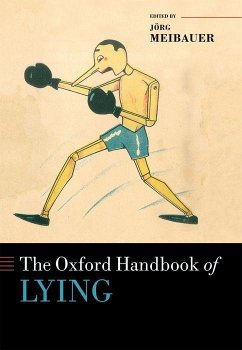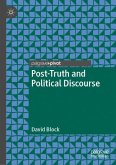Meibauer
Ohb Lying Ohbk C
Meibauer
Ohb Lying Ohbk C
- Gebundenes Buch
- Merkliste
- Auf die Merkliste
- Bewerten Bewerten
- Teilen
- Produkt teilen
- Produkterinnerung
- Produkterinnerung
This handbook brings together past and current research on all aspects of lying and deception, from the combined perspectives of linguistics, philosophy, and psychology. It will be an essential reference for students and researchers in these fields and will contribute to establishing the vibrant new field of interdisciplinary lying research.
Andere Kunden interessierten sich auch für
![Lying at the Semantics-Pragmatics Interface Lying at the Semantics-Pragmatics Interface]() Jörg MeibauerLying at the Semantics-Pragmatics Interface92,99 €
Jörg MeibauerLying at the Semantics-Pragmatics Interface92,99 €![Post-Truth and Political Discourse Post-Truth and Political Discourse]() David BlockPost-Truth and Political Discourse48,99 €
David BlockPost-Truth and Political Discourse48,99 €![Constructions of Intersubjectivity Constructions of Intersubjectivity]() Arie VerhagenConstructions of Intersubjectivity91,99 €
Arie VerhagenConstructions of Intersubjectivity91,99 €![Parts of a Whole Parts of a Whole]() Lucas ChampollionParts of a Whole180,99 €
Lucas ChampollionParts of a Whole180,99 €![Context and the Attitudes, Volume 1 Context and the Attitudes, Volume 1]() Mark RichardContext and the Attitudes, Volume 1112,99 €
Mark RichardContext and the Attitudes, Volume 1112,99 €![Continuations and Natural Language Continuations and Natural Language]() Chris BarkerContinuations and Natural Language165,99 €
Chris BarkerContinuations and Natural Language165,99 €![Pragmatic Aspects of Scalar Modifiers Pragmatic Aspects of Scalar Modifiers]() Osamu SawadaPragmatic Aspects of Scalar Modifiers156,99 €
Osamu SawadaPragmatic Aspects of Scalar Modifiers156,99 €-
-
-
This handbook brings together past and current research on all aspects of lying and deception, from the combined perspectives of linguistics, philosophy, and psychology. It will be an essential reference for students and researchers in these fields and will contribute to establishing the vibrant new field of interdisciplinary lying research.
Hinweis: Dieser Artikel kann nur an eine deutsche Lieferadresse ausgeliefert werden.
Hinweis: Dieser Artikel kann nur an eine deutsche Lieferadresse ausgeliefert werden.
Produktdetails
- Produktdetails
- Verlag: Oxford University Press (UK)
- Seitenzahl: 688
- Erscheinungstermin: 15. Januar 2019
- Englisch
- Abmessung: 254mm x 177mm x 50mm
- Gewicht: 1343g
- ISBN-13: 9780198736578
- ISBN-10: 0198736576
- Artikelnr.: 52904509
- Herstellerkennzeichnung
- Produktsicherheitsverantwortliche/r
- Europaallee 1
- 36244 Bad Hersfeld
- gpsr@libri.de
- Verlag: Oxford University Press (UK)
- Seitenzahl: 688
- Erscheinungstermin: 15. Januar 2019
- Englisch
- Abmessung: 254mm x 177mm x 50mm
- Gewicht: 1343g
- ISBN-13: 9780198736578
- ISBN-10: 0198736576
- Artikelnr.: 52904509
- Herstellerkennzeichnung
- Produktsicherheitsverantwortliche/r
- Europaallee 1
- 36244 Bad Hersfeld
- gpsr@libri.de
Jörg Meibauer is Professor of German Language and Linguistics at Johannes Gutenberg University Mainz. His research focuses on cognitive pragmatics, with an emphasis on the grammar-pragmatics interface. His many publications include Lying at the Semantics-Pragmatics Interface (De Gruyter Mouton 2014) and he is the editor of multiple volumes such as What is a Context? Linguistic Approaches and Challenges (with R. Finkbeiner and P. B. Schumacher; Benjamins 2012) and Pejoration (with R. Finkbeiner; Benjamins 2016).
* 1: Jörg Meibauer: Introduction: What is lying?
* Part I: Traditions
* 2: James Edwin Mahon: Classic philosophical approaches to lying and
deception
* 3: James Edwin Mahon: Contemporary approaches to the philosophy of
lying
* 4: Karol J. Hardin: Linguistic approaches to lying and deception
* 5: Lewis Bott and Emma Williams: Psycholinguistic approaches to lying
and deception
* 6: Alexa Decker, Amanda Disney, Brianna D'Elia, and Julian Paul
Keenan: Lying, deception, and the brain
* Part II: Concepts
* 7: Stephen Wright: Lying and truth
* 8: Mark Jary: Lying and assertion
* 9: Matthew Benton: Lying, belief, and knowledge
* 10: Andreas Stokke: Lying, sincerity, and quality
* 11: Swati Gupta and Andrew Ortony: Lying and deception
* 12: Neri Marsili: Lying and certainty
* 13: Don Fallis: Lying and omissions
* 14: Jörg Meibauer: Lying, implicating, and presupposing
* 15: Kathi Beier: Lying and self-deception
* 16: Eliot Michaelson: Lying, testimony, and epistemic vigilance
* Part III: Types of lies and deception
* 17: Julia Staffel: Knowledge lies and group lies
* 18: Jennifer Lackey: Selfless assertions
* 19: Jörg Meibauer: Bald-faced lies
* 20: Andreas Stokke: Bullshitting
* 21: Jennifer Perillo: Bluffing
* 22: Simone Dietz: White and prosocial lies
* Part IV: Distinctions
* 23: Emar Maier: Lying and fiction
* 24: Matthew McGlone and Max Baryshevtsev: Lying and quotation
* 25: Marta Dynel: Lying and humour
* 26: Rachel Giora: Lying, irony, and default interpretation
* 27: Paul Egré and Benjamin Icard: Lying and vagueness
* 28: Claudia Claridge: Lying, metaphor, and hyperbole
* 29: Marina Terkourafi: Lying and politeness
* Part V: Domains
* 30: Victoria Talwar: Development of lying and cognitive abilities
* 31: Samantha Mann: Lying and lie detection
* 32: Kees van Deemter and Ehud Reiter: Lying and computational
linguistics
* 33: Bella M. DePaulo: Lying in social psychology
* 34: Matthias Gamer and Kristina Suchotzki: Lying and psychology
* 35: Giorgio Ganis: Lying and neuroscience
* 36: Thomas L. Carson: Lying and ethics
* 37: Stuart P. Green: Lying and the law
* 38: Marta Serra-Garcia: Lying in economy
* 39: Anita E. Kelly: Lying and education
* 40: Dariusz Galasi¿ski: Lying and discourse analysis
* 41: Piers Robinson, David Miller, Eric Herring, and Vian Bakir: Lying
and politics
* 42: Thomas L. Carson: Lying and history
* 43: Bettina Kümmerling-Meibauer: Lying and the arts
* 44: Fumiko Nishimura: Lying in different cultures
* Part I: Traditions
* 2: James Edwin Mahon: Classic philosophical approaches to lying and
deception
* 3: James Edwin Mahon: Contemporary approaches to the philosophy of
lying
* 4: Karol J. Hardin: Linguistic approaches to lying and deception
* 5: Lewis Bott and Emma Williams: Psycholinguistic approaches to lying
and deception
* 6: Alexa Decker, Amanda Disney, Brianna D'Elia, and Julian Paul
Keenan: Lying, deception, and the brain
* Part II: Concepts
* 7: Stephen Wright: Lying and truth
* 8: Mark Jary: Lying and assertion
* 9: Matthew Benton: Lying, belief, and knowledge
* 10: Andreas Stokke: Lying, sincerity, and quality
* 11: Swati Gupta and Andrew Ortony: Lying and deception
* 12: Neri Marsili: Lying and certainty
* 13: Don Fallis: Lying and omissions
* 14: Jörg Meibauer: Lying, implicating, and presupposing
* 15: Kathi Beier: Lying and self-deception
* 16: Eliot Michaelson: Lying, testimony, and epistemic vigilance
* Part III: Types of lies and deception
* 17: Julia Staffel: Knowledge lies and group lies
* 18: Jennifer Lackey: Selfless assertions
* 19: Jörg Meibauer: Bald-faced lies
* 20: Andreas Stokke: Bullshitting
* 21: Jennifer Perillo: Bluffing
* 22: Simone Dietz: White and prosocial lies
* Part IV: Distinctions
* 23: Emar Maier: Lying and fiction
* 24: Matthew McGlone and Max Baryshevtsev: Lying and quotation
* 25: Marta Dynel: Lying and humour
* 26: Rachel Giora: Lying, irony, and default interpretation
* 27: Paul Egré and Benjamin Icard: Lying and vagueness
* 28: Claudia Claridge: Lying, metaphor, and hyperbole
* 29: Marina Terkourafi: Lying and politeness
* Part V: Domains
* 30: Victoria Talwar: Development of lying and cognitive abilities
* 31: Samantha Mann: Lying and lie detection
* 32: Kees van Deemter and Ehud Reiter: Lying and computational
linguistics
* 33: Bella M. DePaulo: Lying in social psychology
* 34: Matthias Gamer and Kristina Suchotzki: Lying and psychology
* 35: Giorgio Ganis: Lying and neuroscience
* 36: Thomas L. Carson: Lying and ethics
* 37: Stuart P. Green: Lying and the law
* 38: Marta Serra-Garcia: Lying in economy
* 39: Anita E. Kelly: Lying and education
* 40: Dariusz Galasi¿ski: Lying and discourse analysis
* 41: Piers Robinson, David Miller, Eric Herring, and Vian Bakir: Lying
and politics
* 42: Thomas L. Carson: Lying and history
* 43: Bettina Kümmerling-Meibauer: Lying and the arts
* 44: Fumiko Nishimura: Lying in different cultures
* 1: Jörg Meibauer: Introduction: What is lying?
* Part I: Traditions
* 2: James Edwin Mahon: Classic philosophical approaches to lying and
deception
* 3: James Edwin Mahon: Contemporary approaches to the philosophy of
lying
* 4: Karol J. Hardin: Linguistic approaches to lying and deception
* 5: Lewis Bott and Emma Williams: Psycholinguistic approaches to lying
and deception
* 6: Alexa Decker, Amanda Disney, Brianna D'Elia, and Julian Paul
Keenan: Lying, deception, and the brain
* Part II: Concepts
* 7: Stephen Wright: Lying and truth
* 8: Mark Jary: Lying and assertion
* 9: Matthew Benton: Lying, belief, and knowledge
* 10: Andreas Stokke: Lying, sincerity, and quality
* 11: Swati Gupta and Andrew Ortony: Lying and deception
* 12: Neri Marsili: Lying and certainty
* 13: Don Fallis: Lying and omissions
* 14: Jörg Meibauer: Lying, implicating, and presupposing
* 15: Kathi Beier: Lying and self-deception
* 16: Eliot Michaelson: Lying, testimony, and epistemic vigilance
* Part III: Types of lies and deception
* 17: Julia Staffel: Knowledge lies and group lies
* 18: Jennifer Lackey: Selfless assertions
* 19: Jörg Meibauer: Bald-faced lies
* 20: Andreas Stokke: Bullshitting
* 21: Jennifer Perillo: Bluffing
* 22: Simone Dietz: White and prosocial lies
* Part IV: Distinctions
* 23: Emar Maier: Lying and fiction
* 24: Matthew McGlone and Max Baryshevtsev: Lying and quotation
* 25: Marta Dynel: Lying and humour
* 26: Rachel Giora: Lying, irony, and default interpretation
* 27: Paul Egré and Benjamin Icard: Lying and vagueness
* 28: Claudia Claridge: Lying, metaphor, and hyperbole
* 29: Marina Terkourafi: Lying and politeness
* Part V: Domains
* 30: Victoria Talwar: Development of lying and cognitive abilities
* 31: Samantha Mann: Lying and lie detection
* 32: Kees van Deemter and Ehud Reiter: Lying and computational
linguistics
* 33: Bella M. DePaulo: Lying in social psychology
* 34: Matthias Gamer and Kristina Suchotzki: Lying and psychology
* 35: Giorgio Ganis: Lying and neuroscience
* 36: Thomas L. Carson: Lying and ethics
* 37: Stuart P. Green: Lying and the law
* 38: Marta Serra-Garcia: Lying in economy
* 39: Anita E. Kelly: Lying and education
* 40: Dariusz Galasi¿ski: Lying and discourse analysis
* 41: Piers Robinson, David Miller, Eric Herring, and Vian Bakir: Lying
and politics
* 42: Thomas L. Carson: Lying and history
* 43: Bettina Kümmerling-Meibauer: Lying and the arts
* 44: Fumiko Nishimura: Lying in different cultures
* Part I: Traditions
* 2: James Edwin Mahon: Classic philosophical approaches to lying and
deception
* 3: James Edwin Mahon: Contemporary approaches to the philosophy of
lying
* 4: Karol J. Hardin: Linguistic approaches to lying and deception
* 5: Lewis Bott and Emma Williams: Psycholinguistic approaches to lying
and deception
* 6: Alexa Decker, Amanda Disney, Brianna D'Elia, and Julian Paul
Keenan: Lying, deception, and the brain
* Part II: Concepts
* 7: Stephen Wright: Lying and truth
* 8: Mark Jary: Lying and assertion
* 9: Matthew Benton: Lying, belief, and knowledge
* 10: Andreas Stokke: Lying, sincerity, and quality
* 11: Swati Gupta and Andrew Ortony: Lying and deception
* 12: Neri Marsili: Lying and certainty
* 13: Don Fallis: Lying and omissions
* 14: Jörg Meibauer: Lying, implicating, and presupposing
* 15: Kathi Beier: Lying and self-deception
* 16: Eliot Michaelson: Lying, testimony, and epistemic vigilance
* Part III: Types of lies and deception
* 17: Julia Staffel: Knowledge lies and group lies
* 18: Jennifer Lackey: Selfless assertions
* 19: Jörg Meibauer: Bald-faced lies
* 20: Andreas Stokke: Bullshitting
* 21: Jennifer Perillo: Bluffing
* 22: Simone Dietz: White and prosocial lies
* Part IV: Distinctions
* 23: Emar Maier: Lying and fiction
* 24: Matthew McGlone and Max Baryshevtsev: Lying and quotation
* 25: Marta Dynel: Lying and humour
* 26: Rachel Giora: Lying, irony, and default interpretation
* 27: Paul Egré and Benjamin Icard: Lying and vagueness
* 28: Claudia Claridge: Lying, metaphor, and hyperbole
* 29: Marina Terkourafi: Lying and politeness
* Part V: Domains
* 30: Victoria Talwar: Development of lying and cognitive abilities
* 31: Samantha Mann: Lying and lie detection
* 32: Kees van Deemter and Ehud Reiter: Lying and computational
linguistics
* 33: Bella M. DePaulo: Lying in social psychology
* 34: Matthias Gamer and Kristina Suchotzki: Lying and psychology
* 35: Giorgio Ganis: Lying and neuroscience
* 36: Thomas L. Carson: Lying and ethics
* 37: Stuart P. Green: Lying and the law
* 38: Marta Serra-Garcia: Lying in economy
* 39: Anita E. Kelly: Lying and education
* 40: Dariusz Galasi¿ski: Lying and discourse analysis
* 41: Piers Robinson, David Miller, Eric Herring, and Vian Bakir: Lying
and politics
* 42: Thomas L. Carson: Lying and history
* 43: Bettina Kümmerling-Meibauer: Lying and the arts
* 44: Fumiko Nishimura: Lying in different cultures








